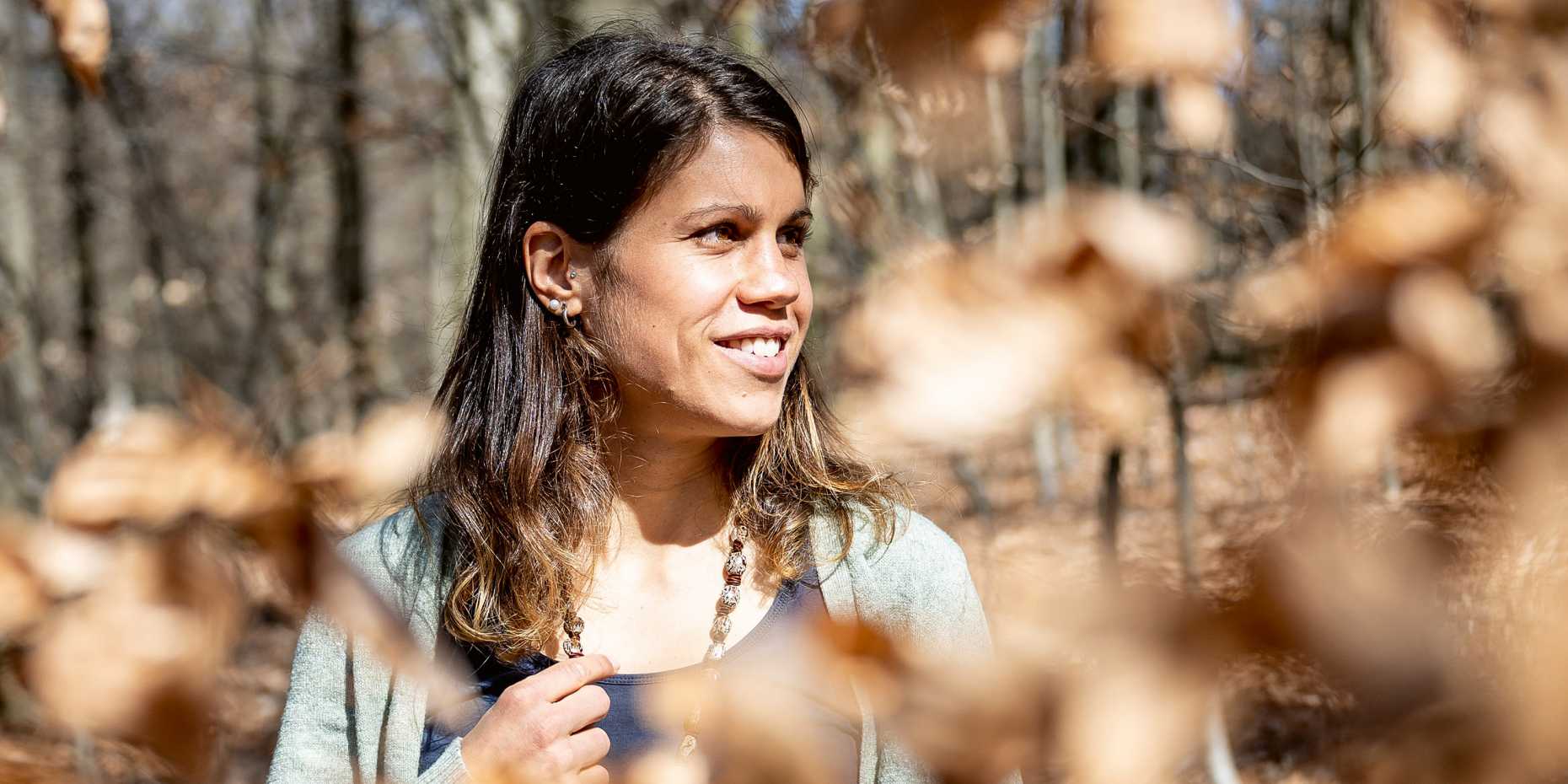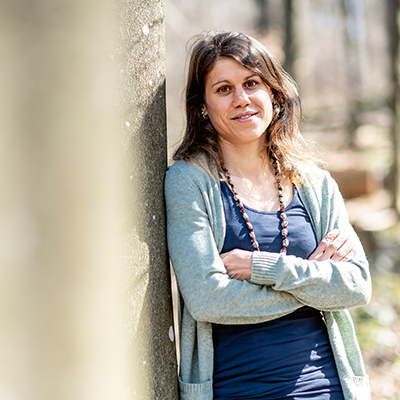“You can't cut corners”
Elena Roos had a tough start in the world of professional sport, but her perseverance took her to the top of the international orienteering rankings. Even a global pandemic can’t stop this ETH alumna.

“Building recovery time into my training schedule isn’t one of my strong points,” Elena Roos confesses with a grin. An elite athlete with an ETH Master’s degree in health sciences and technology, she fully appreciates the importance of regeneration, yet part of her stubbornly refuses to accept it: “Somehow I always think that more is better. If it was up to me, I would always do one more round of training.” Fortunately, her long-time coach, Simone Niggli-Luder, is on hand to help her take a more objective view – and Roos’s recent achievements suggest she has the balance just about right. In 2018, the Ticino native became world and European champion in two different relay disciplines. One year later, she went on to take fifth place in the overall World Cup.
These successes are the reward for a strenuous daily regime of power and endurance training. Roos has loved sport since she was a child, but she is the first to admit that it comes with its ups and downs: “Sometimes, when my whole body is aching, I force myself to imagine that feeling of being on the starting line of a major event. Those are the moments that give me the motivation I need.” Elena first discovered orienteering by chance when she was 10 years old. “I was often homesick as a child, so my parents sent me to a summer camp to make me more independent. And they just happened to choose an orienteering training camp for kids.”
She was immediately hooked. From that moment on, Roos went on regular runs through the forests on the Magadino plain with her local club, Orientisti 92. It wasn’t long before she was entering her first competitions and regularly landing in the top three. At 14, she gained a place in the Ticino junior squad; at 16, she was picked to compete in the European Youth Championships in Slovenia, followed by World Youth Championships in Sweden and then Italy. “The whole atmosphere got more and more serious and competitive,” Roos says. “But it didn’t put me off at all. Quite the opposite, in fact! All that pressure and the sense of responsibility made me work even harder.”
Turbulent times – and a move to ETH
When Roos was 20, the logical next step would have been to move from the junior squad to the elite team. But the sheer joy and pleasure of those early days had been overshadowed by inner conflict. “I suddenly found myself making huge technical errors because I wasn’t properly focused,” says Roos. She admits that her early success made things even tougher: “When you’re young and starting out, you just go for it and end up surprising yourself. But then I began setting the bar too high and striving too hard for success,” she says.
At the same time as trying to deal with this rocky period in her sporting life, Roos was also laying the foundations for her future career. Being a sports teacher had long been a goal, but she was also interested in biology and medicine. Ultimately, it was the recently launched Master of Science ETH in Health Sciences and Technology that gave her the push she needed to leave her home in Cugnasco and head to Zurich. But that wasn’t the only factor that led her to make the move: “Zurich appealed to me as a city – it never even occurred to me to study anywhere else.”
It turned out to be the right decision for her sporting career as well. Zurich is home to one of Switzerland’s two elite orienteering centres, so it was easy to maintain contact to the upper echelons of the sport. Even though she wasn’t initially a member, she was accepted to train with the best squad in Switzerland. “I kept at it and could see I was getting pretty close,” says Roos. But without official squad membership, personal supervision from a trainer and proper training camps, she had to shoulder much of the responsibility herself – all while tackling a challenging degree programme.
She admits it was a tricky balancing act: “It was all about staying organised and disciplined – you can’t cut corners. But I still found time to enjoy student life!” She benefited from ETH’s policy of helping students who are professional athletes to combine their studies and sporting activities – including the option of postponing exams. “Knowing that ETH would be flexible and understanding with any scheduling clashes was a big help,” says Roos.
“Zurich appealed to me as a city – it never even occurred to me to study anywhere else.”Elena Roos
A frustrating hiatus
As time passed, Roos notched up steady progress in her sports and studies. Her physical performance continued to improve, and sports psychology helped to alleviate some of the pressure she felt. Her dry spell finally came to an end in 2014 when she got the opportunity to compete in the European Orienteering Championships in the Portuguese town of Palmela on the Atlantic coast. She came 26th in the middle distance event, which gave her the boost she needed: “It was plain sailing from then on. Each good result gave me the confidence I needed to tackle the next event.”
Then the world was hit by coronavirus – and her string of successes came to an abrupt end. The pandemic derailed almost the entire 2020 season, apart from a month or so of the national championships in the autumn. It was frustrating not being able to put her abilities to the test after a winter of intense training – and not knowing how long it would be before she could compete again. Alongside her sporting activities, Roos also fits in a couple of part-time jobs, working in performance diagnostics at a sports centre and giving athletics training to up-and-coming tennis players. But these, too, were brought to a sudden halt by the pandemic.
A crisis – and a time to reflect
During this period, Roos says she spent a lot of time reflecting on her situation and thinking about her plans for the years ahead. To expand her career options, she also put the time into successfully completing her teaching diploma in sport at ETH. The age of peak performance in orienteering is higher than in other sports, with many athletes enjoying significant success in their 30s. So, if the pandemic permits, there is nothing to stop Roos racking up more international achievements in the future.
She is particularly looking forward to the 2023 World Orienteering Championships in the Swiss canton of Graubünden: “After that, I’ll just have to see,” she says. One decision she needs to make is whether to stay in Zurich for the long term. “Life here is pretty competitive,” she says. That suits her right now, she admits, but she could also imagine returning to Ticino at a later date: “The weather’s better, and the lifestyle is more relaxed.”
Even so, Roos still finds time to unwind in Zurich, especially with friends: “Meeting up for coffee is my favourite hobby!” she says with a smile. A café is her venue of choice, though she does enjoy soaking up the view from the balcony of her flat on the Zürichberg. She also loves reading, and her favourite books come from the home of orienteering: a Scandinavian crime novel is the book most likely to be on her bedside table.
But it’s her love of sport that dominates her leisure time. From mountain biking and cross-country skiing to beach volleyball, sport offers a balance all year round – though the boundary between fun and competitiveness sometimes gets blurred. “When I go biking or cross-country skiing, I still push myself hard whenever I get the chance!”
This text has been published in the 21/02 issue of the Globe magazine.
About

Elena Roos: A professional orienteer with a Master’s degree in health sciences and technology from ETH, Roos’s greatest sporting achievements include one world and two European titles. She also works in performance diagnostics and as an athletics coach. Roos was raised in Cugnasco in the canton of Ticino and now lives in Zurich.